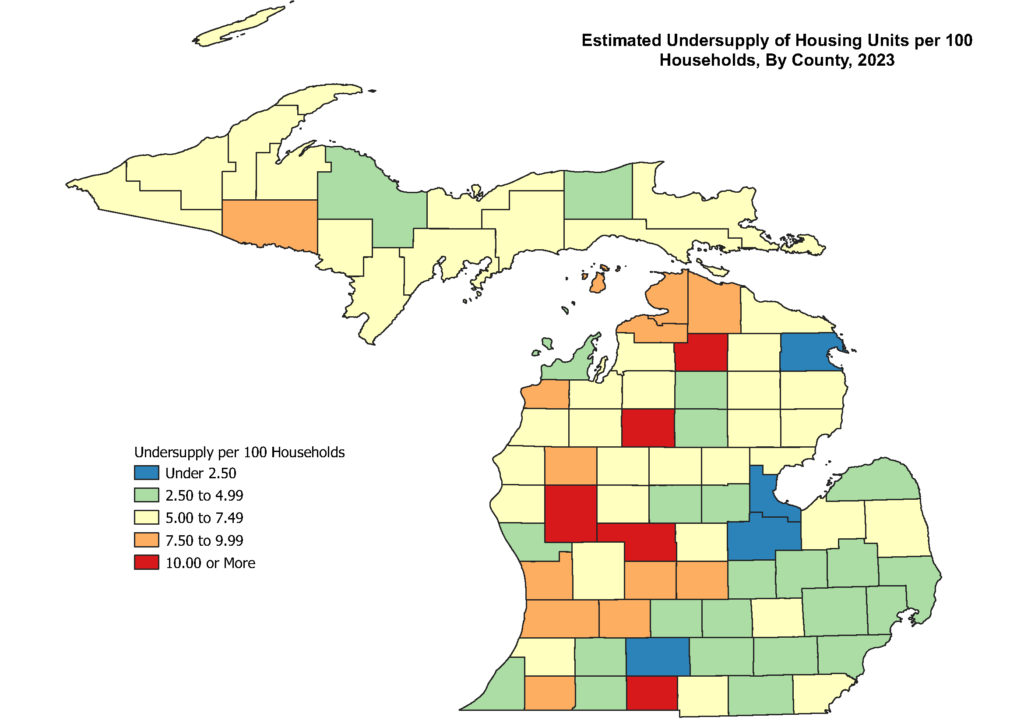Trial court funding reform bills pass House committee
 Time-sensitive legislation to secure key trial court funding took its first step toward passage this week.
Time-sensitive legislation to secure key trial court funding took its first step toward passage this week.
House Bill 5392, by Rep. Sarah Lightner (R-Jackson), extends a quickly approaching May 1, 2024, expiration (“sunset”) of the authority of trial courts to levy fees that constitute a key part of their operational funding.
However, HB 5392 is now “tie-barred” to a separate measure through actions of the House Judiciary Committee. The companion bill, HB 5534, by Rep. Kelly Breen (D-Oakland), outlines a plan for the State Court Administrative Office to conduct data collection on certain trial court costs and revenue sources and provide a report to the Legislature with proposals to implement the Trial Court Funding Commission’s recommendations from 2019. A “tie-bar” means both bills must advance together.
MAC sees broad support for the sunset extension, but the prospects for the companion bill are much less clear. If, for political reasons, the legislation is delayed and not signed before May 1, a funding gap will result.
Courts stand to lose nearly $50 million in operational funding annually if HB 5392 does not pass. This loss of revenue, if not covered by the state, will fall on the counties to cover.
MAC supports both HB 5392 and 5534, with our first priority to move HB 5392 and extend the sunset prior to May 1, as was testified to last Wednesday.
These bills now move to the House floor.
MAC is asking members to take immediate action to urge quick legislative passage. Please visit MAC’s advocacy center to share your support for HBs 5392 and 5534 with your elected officials. The legislative window is closing, as there are limited days for the Legislature to advance the bills to the governor prior to May 1.
For more information on this issue, contact Samantha Gibson at gibson@micounties.org.
MAC joins campaign to repeal state control of energy siting
 The MAC Board of Directors has voted to join the Citizens for Local Choice, a coalition of groups pushing for a statewide vote to repeal sections of a state law that put an unelected state panel in final charge of siting of energy generation facilities.
The MAC Board of Directors has voted to join the Citizens for Local Choice, a coalition of groups pushing for a statewide vote to repeal sections of a state law that put an unelected state panel in final charge of siting of energy generation facilities.
“What we have heard from our own counties, and from colleagues across the state, is that this law enacted last year is a clear attack on local control, an attack Michigan’s 83 counties cannot allow to continue,” said Jim Storey, president of the MAC Board of Directors and chair of the Allegan County Board. MAC is aware of at least nine counties that already have passed resolutions in support of the ballot campaign.
MAC consistently opposed the act as it worked its way through the State Capitol last year, testifying on the consequences of usurping local control and suggesting changes that could facilitate the generation of clean energy without making the state Public Service Commission the final answer on local land use.
“It’s unfortunate we have reached this point, but this measure is so ill-conceived, so counter to the interests of communities and good governance, that MAC has to take this stand,” added Stephan Currie, executive director.
What’s next?
 MAC encourages county leaders to support the coalition’s work in several ways:
MAC encourages county leaders to support the coalition’s work in several ways:
- Pass a county resolution in support of it. The coalition has a template you can use for this purpose. Click here for it.
- Consider circulating petitions for it. Click here to request a petition from the coalition. (Please note there are specific rules on the collection process, so be sure to familiarize yourself with them; the coalition has text and video briefings on that process.)
The coalition now has petitions in the field to collect the 550,000 signatures the group thinks is advisable to meet state requirements for ballot proposals. Only 356,958 valid signatures are needed under state law, but the coalition has set a higher goal to ensure the legal requirement is easily met.)
Time is short, though, as the deadline to collect signatures is approaching on May 29, the deadline to reach the November 2024 ballot.
- Contact your county captain or volunteer to be one. The coalition has at least one county captain in 62 counties, but more are needed, particularly in Southeast Michigan. To volunteer as one, sign up on the website or send a note to citizensforlocalchoice@gmail.com.
- Donate to the campaign. While the coalition is having success using volunteer petition collectors and not using paid ones, unlike other ballot efforts, a full statewide campaign to convince voters this fall will not come cheap. To donate directly to the coalition, click here.
For more information on MAC’s work in defense of local control, contact Director of Governmental Affairs Deena Bosworth at bosworth@micounties.org.
‘Polluter pay’ package would bring problems for counties
 Action could occur in coming weeks on a so-called “polluter pay” package that MAC opposes due to the burdens it would impose on county agencies.
Action could occur in coming weeks on a so-called “polluter pay” package that MAC opposes due to the burdens it would impose on county agencies.
Senate Bills 605-611, led by Sen. Jeff Irwin (D-Washtenaw), add new regulations for businesses and local units of government to own and operate brownfield sites, making it difficult and undesirable to do so. Environmentalists are referring to the package as “polluter pay,” while industry representatives are calling it an attack on brownfield redevelopment.
The lead bill would require all owners of a contaminated property, whether they are responsible for the contamination or not, to conduct a baseline environmental assessment and submit a “due care plan” to the Department of Environment, Great Lakes, and Energy (EGLE) every five years. A due care plan must include specific actions, plus monitoring and reporting requirements.
Contaminated sites will need to be cleaned up to residential standards, the highest level possible. Even if the site is meant to be used as a parking lot, the owner will need to follow remediation guidelines as if the site were to be a neighborhood. Financial considerations are not factored into this requirement in any way.
There is a stipulation for financial assurance on any facility that houses a pollutant. Many counties or their road agencies own salt sheds and oil brine tanks for road maintenance activities. For each of these facilities, a county would need to take out a bond for 70 percent of the cost to remediate the release of all pollutants on site. The response cost would be estimated per pound, or by a third party approved by EGLE.
Other provisions include medical monitoring, allowing EGLE to circumvent the rules-making process and changes to the statute of limitations for discovering contaminants. Aside from brownfield sites and road agencies, county airports also could be affected by this legislation.
MAC anticipates a hearing before the Senate Committee on Energy and Environment sometime in April. MAC will share updates as they become available.
For more information on this issue, contact Madeline Fata at fata@micounties.org.
Podcast 83 discusses court funding, energy conundrums
 What should have been a simple extension on state authority for local courts to levy fees for their operations has turned into a complicated bout of legislative gamesmanship, the Podcast 83 team reported in its newest episode.
What should have been a simple extension on state authority for local courts to levy fees for their operations has turned into a complicated bout of legislative gamesmanship, the Podcast 83 team reported in its newest episode.
On May 1, the state law that allows trial courts to impose fees on defendants, a key part of the overall court funding system, expires. For many months, MAC has been working to, at minimum, get that authority extended to 2026, but the extension may not come until after the authority expires, Samantha Gibson explained.
“Last Wednesday, I testified in the House Judiciary Committee in support of two bills. One … extends the quickly approaching May 1 sunset date … (T)he other bill that MAC supports … that’s a plan for a plan, if you will, that requires the State Court Administrator’s Office to do data collection on court costs, revenue, judicial caseload and a few other things to then give a report to legislators in May of 2026,” Gibson said.
The plan, as of March 11, was to “tie-bar” the bills, meaning either both advance or neither. This complicates passage of the fee authority, especially in light of the Legislature’s upcoming calendar and the continued 54-54 seat deadlock in the House, Gibson said.
In the end, MAC expects fee authority to be extended, but there could be a gap in “coverage,” which would mean missing funds from courts that would have to be made up by someone. “It’s MAC’s position that if the Legislature withholds the bills, and a funding gap occurs that the state is responsible for backfilling those funding and allocating that to local courts, which we saw back in October of 2022,” Gibson added.
In other news:
Madeline Fata reported on a “town hall” held by the state Public Service Commission about the new law giving it the final say on the siting of wind and solar facilities.
“There certainly were a lot of red flags raised (on interpreting the law),” Fata said, “but they’re not done. There’s another meeting on March 19 at 1:30 p.m. There’s a virtual link available. I think it’s great for members to participate on those. They’re also accepting public comment between now and March 25.”
Deena Bosworth reviewed her testimony before the House Local Government Committee on House Bill 5353, a measure to require legislators to consider the fiscal effects of their decisions in order to deter any new unfunded mandates on local governments.
“We’ve seen iterations of this bill in the past. Is there anything different in this bill that would kind of help it or hurt it or anything? As you know, we obviously haven’t seen much action in the past,” Bosworth noted.
View the full video of the episode, recorded on March 11, by clicking here.
Previous episodes can be seen at MAC’s YouTube Channel.
And you always can find details about Podcast 83 on the MAC website.
Local governments explain concerns on energy siting law to state panel
 Local governments voiced concerns over implementing the new renewable energy siting law in the first in a series of public meetings hosted by the Michigan Public Service Commission (MPSC) last week.
Local governments voiced concerns over implementing the new renewable energy siting law in the first in a series of public meetings hosted by the Michigan Public Service Commission (MPSC) last week.
MPSC staff heard from local governments and planning professionals about their many concerns for implementing Public Act 233, which takes effect this November. Among concerns raised were the short timeline for local units to adopt compatible renewable energy ordinances; whether or not locals can include provisions for buffering or screening in their plans; and who enforces compliance after the permitting process is completed.
MAC vigorously opposed the legislation in 2023 that became PA 233.
While the MPSC did not specifically address these concerns, the session served as more of a learning opportunity for their team. MAC notes that the MPSC is an appointed body whose primary function is ratemaking; it has little experience in land use planning or zoning.
The next session is set for March 19 at 1:30 p.m. and is open to the public. We encourage members to tune in and learn more about the upcoming changes.
For more information on this issue, contact Madeline Fata at fata@micounties.org.
Bill to help curb sheriff staffing shortages advances to Senate
 Legislation aimed at addressing staffing shortages in sheriff offices cleared the Michigan House this week in a broad, bipartisan vote.
Legislation aimed at addressing staffing shortages in sheriff offices cleared the Michigan House this week in a broad, bipartisan vote.
House Bill 5203, by Rep. Kelly Breen (D-Oakland), would allow county boards of commissioners to choose if retired county employees who work at a sheriff’s office can continue to receive retirement benefits during a period of re-employment.
By 94-12, HB 5203 was passed out of the House this week. It now moves to the Senate Local Government Committee.
Currently, if a person who has retired and receives retirement benefits becomes re-employed by the same county, their retirement benefit payment is suspended for the length of their re-employment. The bill would allow retirement benefits to continue during re-employment if a retiree becomes employed by a county sheriff’s office.
Allowing counties to re-employ sheriff’s office employees and maintain their retirement benefits will address the severe staffing shortages seen within county sheriff’s offices.
MAC supports this legislation.
For more information on this issue, contact Samantha Gibson at gibson@micounties.org.
Healthy Climate Conference will focus on ‘Accelerating Action’

With unprecedented climate investments from federal and state sources, recently passed legislation, and executive actions to help meet the goals in the MI Healthy Climate Plan (Plan), Michigan is positioned better than ever to achieve the main goal in the Plan of a healthy, prosperous, carbon-neutral Michigan for all residents by 2050.
To learn more, join the Michigan Department of Environment, Great Lakes, and Energy (EGLE) for the 2024 Michigan Healthy Climate Conference at the Lansing Center on May 16-17, 2024.
Building on these actions and the success of last year’s conference, the department is hosting this two-day conference to continue the mobilization of engaged stakeholders and review the actions being taken around the state to implement the goals in the Plan. This year’s conference is expected to draw more than 500 attendees from local, state, federal, and tribal governments, universities, nonprofits, community groups and businesses.
With the theme of this year’s conference being “Accelerating Action,” speakers will share about their success stories, challenges, funding opportunities, technical assistance, and other actions they are taking in the six priority areas of the Plan:
- Commit to environmental justice and pursue a just transition
- Clean the electric grid
- Electrify vehicles and increase public transit
- Repair and decarbonize homes and businesses
- Drive clean innovation in industry
- Protect Michigan’s land and water
Click here to start your registration.
 Staff picks
Staff picks
- U.S. Treasury issues final regulations for Inflation Reduction Act elective pay mechanism (NACo News)
- State awards $3.6 million for invasive species projects (Michigan Department of Environment, Great Lakes and Energy)
- Fiscal Snapshot: Judges’ Compensation (House Fiscal Agency)
- Moving trees north to save the forest (Knowable Magazine)

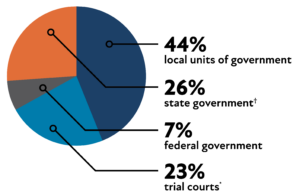
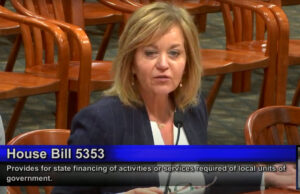
 Severe shortages in staffing and bed space are limiting the effects of juvenile justice reforms enacted last year, MAC told a Senate appropriations subcommittee this week.
Severe shortages in staffing and bed space are limiting the effects of juvenile justice reforms enacted last year, MAC told a Senate appropriations subcommittee this week. Treatment options in counties for justice-involved or high-risk youth will be expanded by the Michigan Department of Health and Human Services (MDHHS) with a $825,000 grant from the federal government.
Treatment options in counties for justice-involved or high-risk youth will be expanded by the Michigan Department of Health and Human Services (MDHHS) with a $825,000 grant from the federal government. Funding opportunities for household hazardous waste collections and setting up waste diversion centers will soon be available to counties. The U.S. Environmental Protection Agency (EPA) has shared the following information with the Michigan Department of Environment, Great Lakes, and Energy:
Funding opportunities for household hazardous waste collections and setting up waste diversion centers will soon be available to counties. The U.S. Environmental Protection Agency (EPA) has shared the following information with the Michigan Department of Environment, Great Lakes, and Energy: Since 1970, the NACo Achievement Awards have recognized outstanding county government programs and services. Through a non-competitive application process, noteworthy programs receive awards in 18 categories that cover a vast range of county responsibilities.
Since 1970, the NACo Achievement Awards have recognized outstanding county government programs and services. Through a non-competitive application process, noteworthy programs receive awards in 18 categories that cover a vast range of county responsibilities.
 Retired Adm. Peter Cressy, director of Executive Leadership Programs at the Washington Leadership Institute, will speak on: “Washington, Lincoln, Roosevelt, Churchill: A Strategic Approach to Leading in Times of Crisis and Change: Washington and these other great leaders manifested eight common characteristics in leading during times of crisis and change, ranging from visibility and communication to planning and collaboration. This popular session will explore examples of these traits during the times of crisis each of these outstanding leaders faced, which remain relevant today” at the 2024 Legislative Conference.
Retired Adm. Peter Cressy, director of Executive Leadership Programs at the Washington Leadership Institute, will speak on: “Washington, Lincoln, Roosevelt, Churchill: A Strategic Approach to Leading in Times of Crisis and Change: Washington and these other great leaders manifested eight common characteristics in leading during times of crisis and change, ranging from visibility and communication to planning and collaboration. This popular session will explore examples of these traits during the times of crisis each of these outstanding leaders faced, which remain relevant today” at the 2024 Legislative Conference. Leading in times of crisis and change will be the theme of the keynote address at the 2024 Michigan Counties Legislative Conference, to be held April 29-May 1 in Lansing.
Leading in times of crisis and change will be the theme of the keynote address at the 2024 Michigan Counties Legislative Conference, to be held April 29-May 1 in Lansing.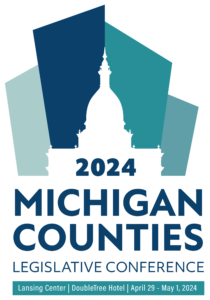
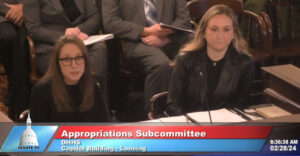 MAC’s Amy Dolinky and Samantha Gibson testified before the Senate Department of Health and Human Services (DHHS) Appropriations Subcommittee on Wednesday to share the association’s work with counties relating to opioid settlement dollars.
MAC’s Amy Dolinky and Samantha Gibson testified before the Senate Department of Health and Human Services (DHHS) Appropriations Subcommittee on Wednesday to share the association’s work with counties relating to opioid settlement dollars. Counties enjoy 90 percent success rate in millage elections
Counties enjoy 90 percent success rate in millage elections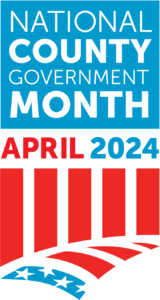 ‘ForwardTogether’ is theme of 2024 National County Government Month
‘ForwardTogether’ is theme of 2024 National County Government Month Seventy-one counties will share in $43.5 million in revenue from the Michigan Department of Treasury for the taxes and fees collected in state fiscal 2023 under the
Seventy-one counties will share in $43.5 million in revenue from the Michigan Department of Treasury for the taxes and fees collected in state fiscal 2023 under the  A forum to brief county and other local leaders on resources to prevent and respond to mass shootings will be held on April 17 in Lansing.
A forum to brief county and other local leaders on resources to prevent and respond to mass shootings will be held on April 17 in Lansing. How to process and communicate your budget will be among the topics explored at the next “Fiscally Ready Communities” webinar on March 14.
How to process and communicate your budget will be among the topics explored at the next “Fiscally Ready Communities” webinar on March 14. The Municipal Stability Board is soliciting feedback on February 2024 revisions to the Corrective Action Plan Development: Best Practices and Strategies document, which was originally issued in 2018.
The Municipal Stability Board is soliciting feedback on February 2024 revisions to the Corrective Action Plan Development: Best Practices and Strategies document, which was originally issued in 2018.
